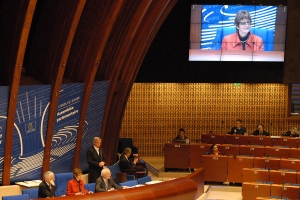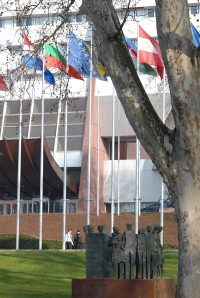“Paper is patient, but nature isn’t”
 Last Thursday, the Parliamentary Assembly of the Council of Europe (PACE), an assembly of national parliamentarians which meets four times a year, debated and agreed two demanding resolutions: on climate change and on energy use. The statements made during the debate were wide-ranging. Refreshingly, many speakers mentioned the connections between climate change and human well-being. The climate change reportmentions the impact of climate change on the protection of human rights around the globe. Poverty, growing social inequality, and overuse of natural resources, were all pressing contemporary problems which were recurring themes during the debate. The rapporteur on the climate change resolution, John Prescott from the UK, highlighted two key words: equitability and fairness. Both, he said, are essential to any agreement.
Last Thursday, the Parliamentary Assembly of the Council of Europe (PACE), an assembly of national parliamentarians which meets four times a year, debated and agreed two demanding resolutions: on climate change and on energy use. The statements made during the debate were wide-ranging. Refreshingly, many speakers mentioned the connections between climate change and human well-being. The climate change reportmentions the impact of climate change on the protection of human rights around the globe. Poverty, growing social inequality, and overuse of natural resources, were all pressing contemporary problems which were recurring themes during the debate. The rapporteur on the climate change resolution, John Prescott from the UK, highlighted two key words: equitability and fairness. Both, he said, are essential to any agreement.
The urgency and inevitability of the changing climate was highlighted. Or, as an Austrian parliamentarian put it, we are in the same position as the passengers on the Titanic, celebrating as the ship went down. The resolution states “Our success, or failure, in tackling climate change will shape the world we leave for future generations. If we succeed, we will not only safeguard our planet’s resources, but also unleash immense economic opportunities for sustainable development, quality job creation and anti-poverty action. If we fail, the disruption to the global climate, environment, biodiversity and human well-being will be unprecedented.” A Finnish representative described the situation as absurd: that we know fossil fuels are the cause of this emerging crisis and yet we are using more and more fossil fuels. A Russian parliamentarian called for decreased consumption of energy, and dismissed trading schemes, saying, ‘we should not trade in permission to pollute the atmosphere.’ European parliamentarians – at least those who stay for Thursday evening at the PACE (58 voted on the climate change resolution) – are aware of the problems and the need for comprehensive solutions.
One of the reports was on climate change and the second on the need for diverse and lower-impact energy sources. Both resolutions were passed, although neither report included a recommendation which would have been submitted to the Committee of Ministers for reply.
 The debate was fascinating. Many parliamentarians called for greater energy efficiency and support for those who cannot afford to insulate their houses. The double bind in which we have put ourselves, by predicating growth on the use of natural resources including energy sources, was encapsulated by a Greek parliamentarian. She stated that Greece had discarded the idea of a policy of reducing energy demand, because it would mean fewer jobs in an already strained economic situation. Unfortunately, no one in that discussion seemed able to point out that increasing the energy efficiency of existing infrastructure, including residences and offices, can create quite a few jobs. Nor did anyone point out that the Canadian observer’s assumption that there is a direct link between economic activity and energy consumption is not proven. This is crucial, because it is this kind of thinking — jobs or the environment — which is a main obstacle to our taking steps to mitigate the severity of global climate change or to tackle other urgent environmental problems which we face as a global society.
The debate was fascinating. Many parliamentarians called for greater energy efficiency and support for those who cannot afford to insulate their houses. The double bind in which we have put ourselves, by predicating growth on the use of natural resources including energy sources, was encapsulated by a Greek parliamentarian. She stated that Greece had discarded the idea of a policy of reducing energy demand, because it would mean fewer jobs in an already strained economic situation. Unfortunately, no one in that discussion seemed able to point out that increasing the energy efficiency of existing infrastructure, including residences and offices, can create quite a few jobs. Nor did anyone point out that the Canadian observer’s assumption that there is a direct link between economic activity and energy consumption is not proven. This is crucial, because it is this kind of thinking — jobs or the environment — which is a main obstacle to our taking steps to mitigate the severity of global climate change or to tackle other urgent environmental problems which we face as a global society.
The PACE resolution asks the G8 and G20 to push for development of a green economy – but exactly what a green economy is, is yet to be defined. It is difficult to know whether one is taking steps towards a target when it is still undefined!
The climate change resolution calls for a UN agreement which requires national legislation in each country by 2020, and an international review panel which would evaluate the implementation of national laws and their effectiveness in reducing carbon emissions. The resolution also calls for international cooperation to share best practice and develop shared approaches. And it demands a target of a reduction in greenhouse gas emissions by 20% compared to 1990 levels by 2030, and 50% by 2050. The EU has a roadmap aiming at a reduction of 80% by 2050. The EU is more committed: a week before this PACE debate, the European Commission announced binding EU targets of 40% below 1990 levels by 2030. On 5 February, this motion was passed by the European Parliament. The targets will now be debated by the Council of the European Union (heads of government summit) in March. Has complacencyfinally been vanquished; will the action taken be enough?

Leave a Reply